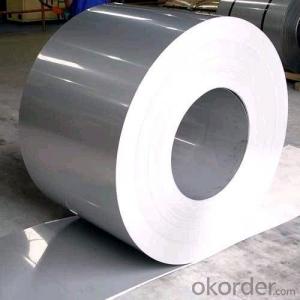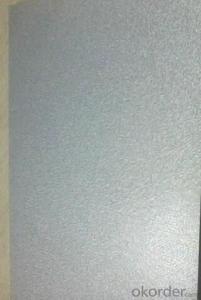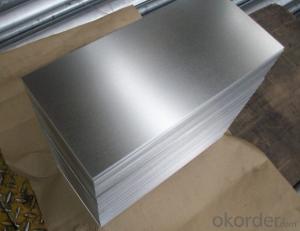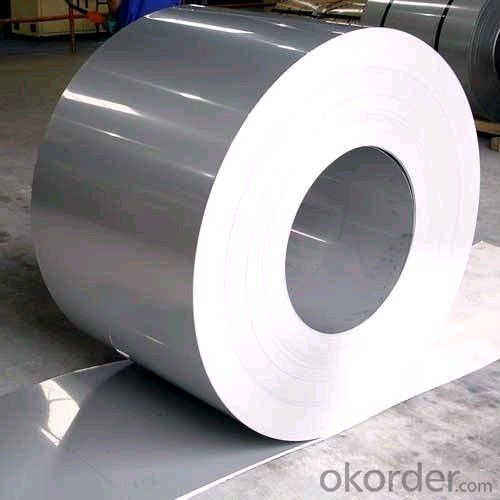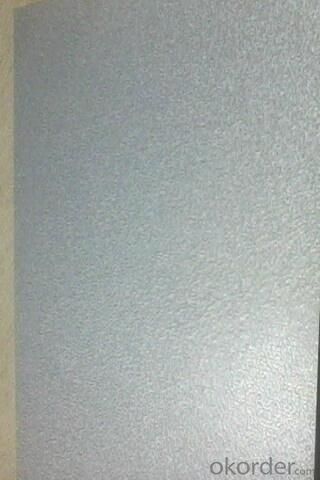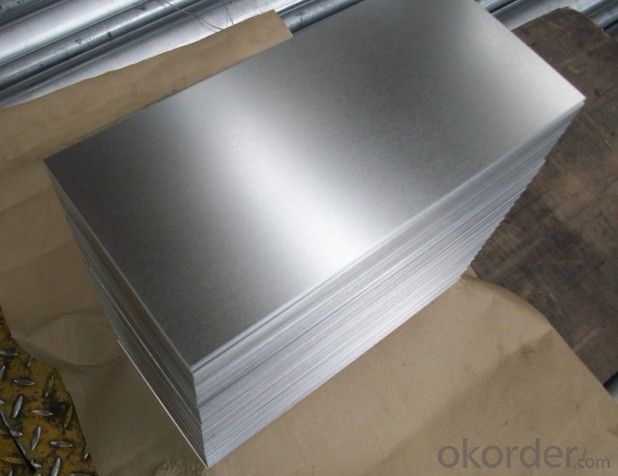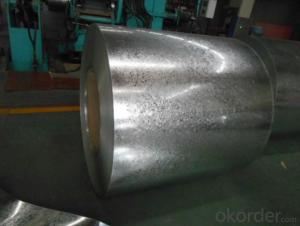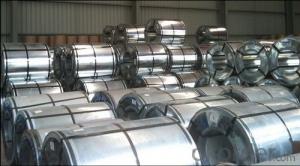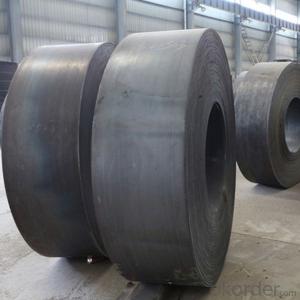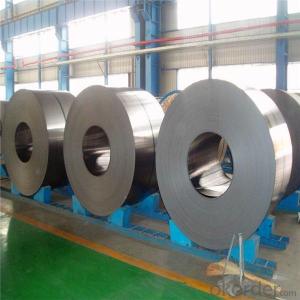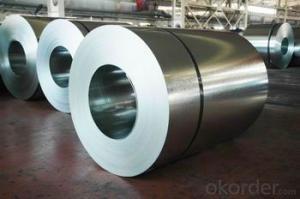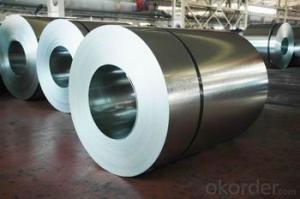Hot-dip Zinc Coating Steel Sheets in Coils in Prime Quality and Best Price
- Loading Port:
- Shanghai
- Payment Terms:
- TT or LC
- Min Order Qty:
- 100 m.t.
- Supply Capability:
- 10000 m.t./month
OKorder Service Pledge
OKorder Financial Service
You Might Also Like
1.Structure of Galvanized Steel Coil Description:
Hot-dip galvanized steel coils are available with a pure zinc coating through the hot-dip galvanizing process. It offers the economy, strength and formability of steel combined with the corrosion resistance of zinc. 2.Main Features of the Galvanized Steel Coil:
• Base material for countless outdoor and industrial applications
• High corrosion resistance
• High strength
• Good formability
3.Galvanized Steel Coil Images
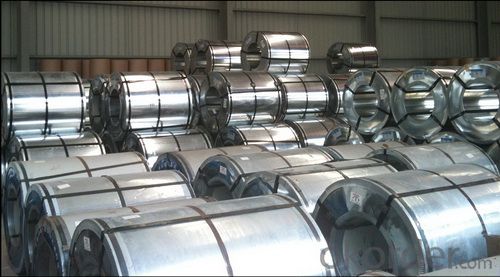
4.Galvanized Steel Coil Specification
Operate Standard: ASTM A653M-04/JIS G3302/DIN EN10143/GBT 2518-2008
Grade : SGCD,SGCH, Q195,DX51D
Width:914-1250mm(914mm, 1215mm,1250mm,1000mm the most common) Coil id:508mm/610mm Coil weight: 4-10 MT(as required) Zinc coating :40-180g( as required
Surface: regular/mini/zero spangle, chromated, skin pass, dry etc.
5.FAQ of Galvanized Steel Coil
We have organized several common questions for our clients,may help you sincerely:
1.What advantages does your company have?
A world class manufacturer & supplier of castings forging in carbon steel and alloy steel,is one of the large-scale professional investment casting production bases in China,consisting of both casting foundry forging and machining factory. Annually more than 8000 tons Precision casting and forging parts are exported to markets in Europe,America and Japan. OEM casting and forging service available according to customer’s requirements.
2.What advantages do your products have?
Firstly, our base material is of high quality, Their performance is in smooth and flat surface,no edge wave ,good flexibility.
Secondly, high quality zinc ingoats, 97.5% zinc,1.5% silicon,1% others, the same zinc coating measured by metal coating thickness or by zinc weight
Thirdly, high precision: Tolerance strictly according to ASTM or JISG standard even more rigid.
We have full stes of testing equipment(for t best, cupule,chromatism,salt spray resistance, etc) and professional engineers.
3.Could you let me approach about your company in Dubai?
Located at Jebel Ali Free Zone in Dubai, CNBM Dubai Logistics Complex is adjacent to -Jebel Ali sea port-the largest port in UAE and Al Maktoum Airport-the largest airport in the world, which covers an area of 50,000 square meters, including an fully enclosed warehouse by 10,000 square meters, an open yard by 25000 square meters, and 13 standard unloading platform. CNBM Dubai Logistics Complex formally put into operation on August 1, 2013. Dubai Logistics Complex will commit itself to build the most professional and most influential building materials distribution center of China’s building materials industry in the UAE and throughout the Middle East and Africa.
- Q: I want to start getting throwing knives and i was wondering what material is best for quality, but still cheap. I also saw some 440 stainless steel knives that i liked and wanted to know if the material was good
- For throwing knives, 440 isn’t necessarily a bad choice. Does it list whether it is 440c or 440b? That matters somewhat. The advantages of 440 Stainless is that it’s relatively hard (for a stainless), it resists rust significantly, and it’s not so hard that it would shatter or break. On the down side 440 is notorious for not taking or holding an edge, but for a throwing knife, that’s probably not much of an issue. If you’re looking for something to train with, you’re fine here. It’s plenty of steel enough to stick in wood or other targets. Odds are it won't bend if you slam it into some wood. If it lands on concrete, eh, it's going to scratch and all that jazz, and it might hurt the tip if it hits first, but as has been said, you can use a file or grinder to get the tip back.
- Q: My daughter wants a pair of steel toe cap boots for around the horses but wants them warm, so ideally fur lined etc. Does anybody know where I could purchase them as everywhere I look its only one or the other, cant get steel with fur lining. Very frustrating. I live in the uk. Many thanks.
- Steel toe boots around horses is a big no-no! horses are heavy enough to bend the steel and that could possibly cut into her foot. Even if it doesn't cut into her foot, the boot is ruined after the first time a horse does step on it. On the other hand, Mountain Horse and Ariat both make great winter riding boots.
- Q: Looking for an insight here into what hiking with steel toe-capped boots would be like, as I saw a nice pair of steel toed magnums that I plan to use for my future hiking (which I will be doing a fair amount of in the future). They seemed fairly comfortable, but I am curious into what others have to say and what might be known of this sort of approach. Thanks in advance.
- Steel toed boots are very heavy compared to hiking boots, after a long hike (especially in rough terrain) the extra weight is gonna tire you out. Steel toes are made for things like construction, or doing a task where extra protection of the toe is needed. So it's not ideal, but whatever floats your boat man (better than wearing tennis shoes). I personally have Converse composite toed boots from my airsofting days and since im too cheap to buy dedicated hike boots, I use it for hiking. Its supposedly made for military use and is much lighter than steel toe. But WAIT!!! lets say you dont have a gun or knife and you run into a pissed off Sasquatch, a steel toe boot too the nutz would do well in puttin the hurt on the dude.
- Q: steel strutural
- how much of IS2062-92
- Q: How are steel coils used in the production of steel connectors?
- Steel coils are used in the production of steel connectors as they serve as the primary raw material. The coils are unrolled and then processed through various manufacturing techniques, such as cutting, stamping, and bending, to shape them into the desired connector forms. These connectors are crucial components used to join different steel structures together, ensuring strength, stability, and structural integrity in various applications like construction, automotive, and engineering industries.
- Q: case hardening steel is adviced or thru hardening steel is most suitable?
- I don't know your application, but here is some advice. Case hard provides a hard shell around soft steel, depending on the bake, the case is usually .002-.008 thick. (thousands of an inch) Heat treated steel or tool steel is hard all the way thru. Case hardening, provides toughness with flexibility, however, once it's compromised, the part is scrap. Hardend tool steel is extreemly hard throughout and the harder it is, the more brittle it becomes. The application of the part will help you to determine the material needed. For instance; Plastic injection molds are very hard so the hot plastic wont erode them over years of use. Punch Press dies aren't as hard but are tougher to withstand the shock. Machine bolts are case hardened so they can last, but soft enough to allow some stretching during tightening. Either way, the time in mfg will be about the same. Most tool steels today cut like cheese, but take time to be heat treated. Tool steel will cost a bit more than low carbon steel. Low carbon steel is as machinable, and cheaper, but, again, the baking period is as long or longer than tool steel. There are a lot of materials on the market today that maintain the durability of heatreated steel without having to go thru that process. 4140, ( or chrome/moly) comes to mind. There are also some 400 series stainless that work as well, and others. You need to determine strength, flexibility, ease of mfg, cost and repairability when considering which steel to use.
- Q: I've heard different things bout them, though I do not know this. Oh, and if you know where you can buy some raw or get custom made stuff out of black steel please let me know it would be greatly appreciated. Oh and my friend told me there is a black steel that can be sharpened and silver will be underneath, is this also true? Thank you very much for answering ^^
- My son is a bit and spur maker,I asked him about that and he told me that it is a tag they put on bits so a novice person will pay more for a bit that is not any better. Steel is Steel You should have a lot of bite with that bit because it is a pretty fine diameter. The black patina will wear off with use. BTW he just sent two silver bits to a big show in Reno Nev. I have not seen them or pictures of them but he has a $2,000 price tag on each of them. They must be real elaborate probably very fancy spade bits with highly engraved multicolored different metal butterflies on the ports.
- Q: I'm putting a bathroom in my basement. I'm an Ironworker btw. I wanted to go with steel studs due to the fact that they are light, and I won't have a big mess. I live in the Chicago area and they should be easy to find. Here is my question. Are they not being used anymore? I ordered 100 studs from Lowe's but they didn't have track. The delivery guy was a retired Carpenter and he told me that I got all the studs they had, they no longer stock steel studs, and they don't have track. Am I missing something? Menards didn't have track either.
- Ask a Carpenter friend where you can buy metal studs. There should be a large drywall supplier somewhere close to your area - they usually also stock metal studs and ceiling grid that sort of all goes together for contractors. You will have a choice of 20 or 25 gauge studs track. 25 gauge is pretty flimsy so I suggest using 20 gauge. Get a small box of tek screws to attach studs to track. Also get some self drilling drywall screws 1+5/8 for 5/8 thick gyp bd. or 1+1/4 for 1/2 gyp bd. I would also buy MR drywall (moisture resistant) for any work in a basement. Another tip : Buy some 1x4 composite trim boards to use for your bottom plate. Clean the slab good where you plates will go, then use some Liquid Nails hd and glue your plates down to the slab. That way you won't be drilling holes in the slab that could allow water to seep up through them. The composite trim will not wick moisture and it will keep your metal studs up off the floor should you ever have a water problem in the bathroom. Keep your drywall up off the floor about 1/2 by laying a scrap pc. of drywall against the plate before you hang the board. Allow enough room to line the perimeter of your door frame with 2x 4 vs. metal stud. It makes it easier installing the door and trim.
- Q: My teacher says if they were that they would still be standing today. I'm not sure if he means the reinforced steel in the concrete beams, columns etc or if the whole beams and columns floor etc were were made of reinforced steel.
- Reinforced Steel is found in concrete, and if the towers were built with reinforced concrete (concrete beams with rebar) then they would likely still be standing. The twin towers were made of steel. When steel is heated up, it deforms and collapses, which is why it didnt stand up. One of the top 2 things against steel is that it is not fire resistant.
- Q: A 100 kg solid steel ball with a radius of 5 m is being spun on ice with an angular velocity of 5 rev/s pointed into the ice (clockwise rotation when viewed from above).A student shoots a 10 kg marble at the steel ball. The marble hits the ball along its side as shown with an initial velocity of 5 m/s to the left. If, right after the collision, the final velocity of the marble is 2.5 m/s to the left, what is the angular velocity of the steel ball after the collision?
- You need to do conservation of angular momentum about the steel ball's axis. Angular momentum = I.ω The steel ball's initial ω = 5 rev/s = 5*2pi rad/s = 31.4 rad/s The steel ball's moment of inertia I = (2/5)*m*r^2 = 40*25 kg.m^2 = 1000 kg.m^2 The marble's initial ω = v / r where r is the perpendicular distance from the steel ball's axis You need to look at the diagram for this. The marble's I about the steel ball's axis is I = m*r^2 where r is the same as above. (marble is treated as a point mass). Then work out the total initial ang. momentum = final ang. momentum and solve for ω...
Send your message to us
Hot-dip Zinc Coating Steel Sheets in Coils in Prime Quality and Best Price
- Loading Port:
- Shanghai
- Payment Terms:
- TT or LC
- Min Order Qty:
- 100 m.t.
- Supply Capability:
- 10000 m.t./month
OKorder Service Pledge
OKorder Financial Service
Similar products
Hot products
Hot Searches
Related keywords
